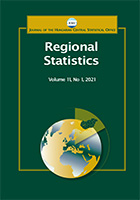The well-being of internal migrants and their children in destination districts in Vietnam: A microeconometric analysis, 2015
The well-being of internal migrants and their children in destination districts in Vietnam: A microeconometric analysis, 2015
Author(s): Dung Quang Nguyen, Dung Tien Hoang, Huyen Khanh Giang Nguyen, Trung Xuan Hoang, Tuyen Quang TranSubject(s): Social Sciences, Economy, Geography, Regional studies
Published by: Központi Statisztikai Hivatal
Keywords: internal migration; well-being, health; school dropout; Vietnam
Summary/Abstract: This paper investigates the impact of internal migration on the well-being of migrants and their children in destination areas in Vietnam using the 2015 National Internal Migration Survey. Vietnam is a transition economy with rapid industrialization, which has booted the flow of migration from rural to urban areas. To rule out time-invariant factors, which may affect the estimation results, the model regressions control for district-level fixed effects, industry-level fixed effects, and age fixed effects. The authors show that migrants work longer and are less likely to have an employment contract and health insurance than nonmigrants. Although migrants are more likely to drink alcohol, they do not seem to be heavy drinkers. Meanwhile, migrant children aged 5–18 are 6.5% more likely to drop out of school than nonmigrant children. Long-term migrants have better working conditions, such as shorter working hours, verbal employment contracts, and social and health insurance. Female migrants are less likely to find a job than male migrants, and educated migrants find it easier to get a job and earn better income than uneducated migrants. The findings suggest that governments should design specific policies for internal migrants, such as integration and social protection measures, to help them overcome the difficulties they encounter.
Journal: Regional Statistics
- Issue Year: 14/2024
- Issue No: 01
- Page Range: 61-90
- Page Count: 30
- Language: English

